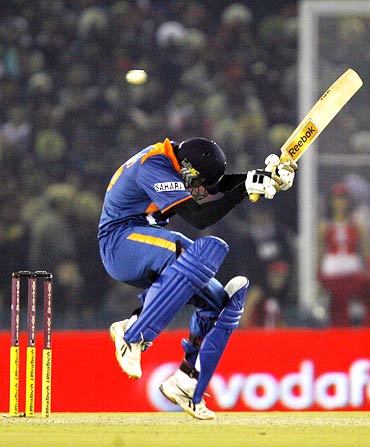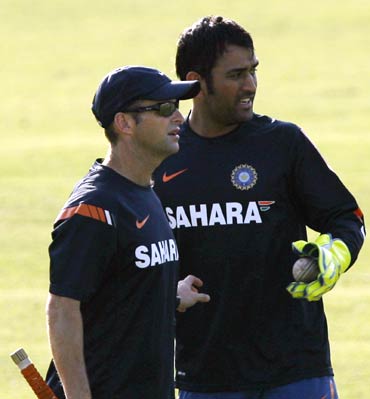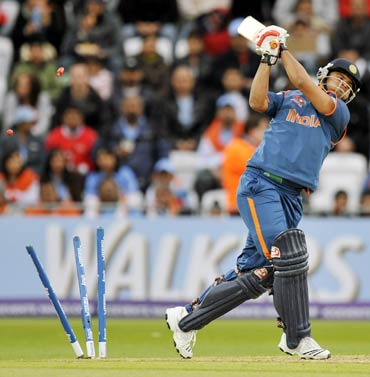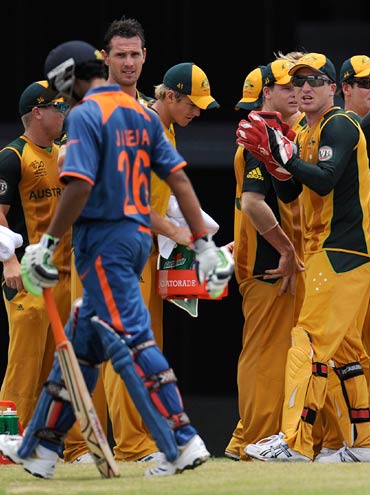The Caribbean Islands immediately evoke emotions of joy, fun and frolic.
Yet, in two World Cup outings, first in 2007 (ODI) and now in 2010 (T20), the Indian cricket team has left its fans grappling with the opposite emotions.
The West Indies have proved to be anything but the idyllic getaway they are made out to be on Discovery Travel and Living for our much hyped cricketers. But the problem cannot be explained away as a mere jinx.
For the second straight T20 World Cup, India was literally bounced out of the tournament. The biggest problem with the T20 format is that because performances from the previous day become a distant memory by the time the first rays of the sun appear the next morning, it is impossible to recollect why India crashed out of the ICC World T20 in England in June 2009.
The reason then, as now, was the inability of the top-order batsmen to handle the short-pitched delivery.
In England in 2009, three teams -- the West Indies, England and South Africa -- exploited India with this very tool, and the result was a humiliating exit for the then defending champions of the T20 World Cup.
Text: Akshay Manwani/Business Standard
Photograph: Reuters
The ghosts of 2009 revisited the Indian batting juggernaut
Image: India coach Gary Kirsten (left) with captain Mahendra Singh DhoniWith Gary Kirsten at the helm, one would have hoped that the South African coach of the Indian team would have ensured that the right lessons were learnt in time for West Indies 2010. This has proved to be an illusion.
Against Australia and then against the West Indies, in the first two Super Eight matches, the ghosts of England 2009 revisited the Indian batting juggernaut.
The worst part is that, with the exception of Murali Vijay, India played virtually an unchanged batting lineup from the previous edition.
Yet the very men who were at the centre of India's debacle 10 months ago did precious little to correct their techniques to confront the challenges of quality pace bowling. It is this unwillingness to learn that makes the great Sachin Tendulkar's efforts to enlist the services of L Sivaramakrishnan, ahead of his battles with Shane Warne in 1998, so awe-inspiring.
If genius (read Tendulkar) can put in the hard yards, why can't the Suresh Rainas of the world do the same?
IPL hurting India's Test future?
Image: Suresh Raina is bowledSadly, with the IPL becoming the foremost avatar of modern-day cricket, given its immense commercial benefits for Indian cricketers, there is little or no need for these batsmen to correct themselves in the nets.
There is no real need to sweat over the chinks in the batting armour when a couple of good years on flat tracks in the IPL are sure to bring in more moolah than all the years on the international Test circuit.
Yet with Rahul Dravid, VVS Laxman and Tendulkar edging closer to retirement with each passing day, will victory overseas again become a luxury for visiting Indian Test sides -- as in the pre Sourav Ganguly era?
Worse, what if the same T20 stars are exposed to the perils of fast bowling on some of the faster Indian wickets (such as Bangalore or Mohali) in a crucial ODI World Cup game in 2011?
The other crucial question thrown up by India's exit is the issue of selection. This is not in reference to Vijay's inclusion, a last-minute selection after Virender Sehwag had to drop out owing to injury. Some might argue that Robin Uthappa might have been a better option instead of Vijay whose selection proved to be a dud, but that is entirely in hindsight.
Even if Uthappa had played well, would it have been effective enough for India to have won two Super Eight matches where they lost all three? I cannot imagine Uthappa's form having that kind of effect on this Indian side. Yuvraj Singh and Mahendra Singh Dhoni, yes; Uthappa, no.
Important that India learns from mistakes
Image: Ravindra Jadeja walks back as Australian players celebrateThe greater enigma was that of Ravindra Jadeja's selection in the current squad and his continued selection thereafter.
In IPL 2, Jadeja put in a creditable performance, leading the batting average for his Rajasthan Royals, and he had the lowest economy rate (6.47 runs per over) of all the Rajasthan bowlers who had bowled more than 20 overs. Yet his team finished sixth at the end of the league stage.
Nevertheless, a selection to the T20 World Cup in England in 2009 was well deserved. Then, suddenly, Jadeja found himself under immense scrutiny after a 35-ball knock for 25 runs saw India lose to England by a mere three runs in a do-or-die game. He then missed out on IPL 2010 as a penalty for trying to negotiate terms with another franchise. What led to his selection in this T20 World Cup, then, is anybody's guess.
In the four games that he played, other than the opening game against Afghanistan, where his bowling figures were an impressive 4-1-15-1, Jadeja conceded 102 runs in just eight overs, bagging only one wicket in the next three games. On the two occasions that he came out to bat, he scored four runs, batting at number eight against Australia, and remained unbeaten at five, batting at number nine against the West Indies. Dhanraj Pillay might have had a bigger impact.
It is one thing being given a player in a squad of 15 and quite another to include him in the playing 11, game after game, when the chips are down. It is exactly the kind of decision that should make people reserve their opinion on Dhoni's merits as a captain.
With the ICC Cricket World Cup less than 10 months away, it is important that Dhoni and his men learn from their mistakes. After all, public memory in the 50-over game is far longer and a bit more unforgiving.





Comment
article